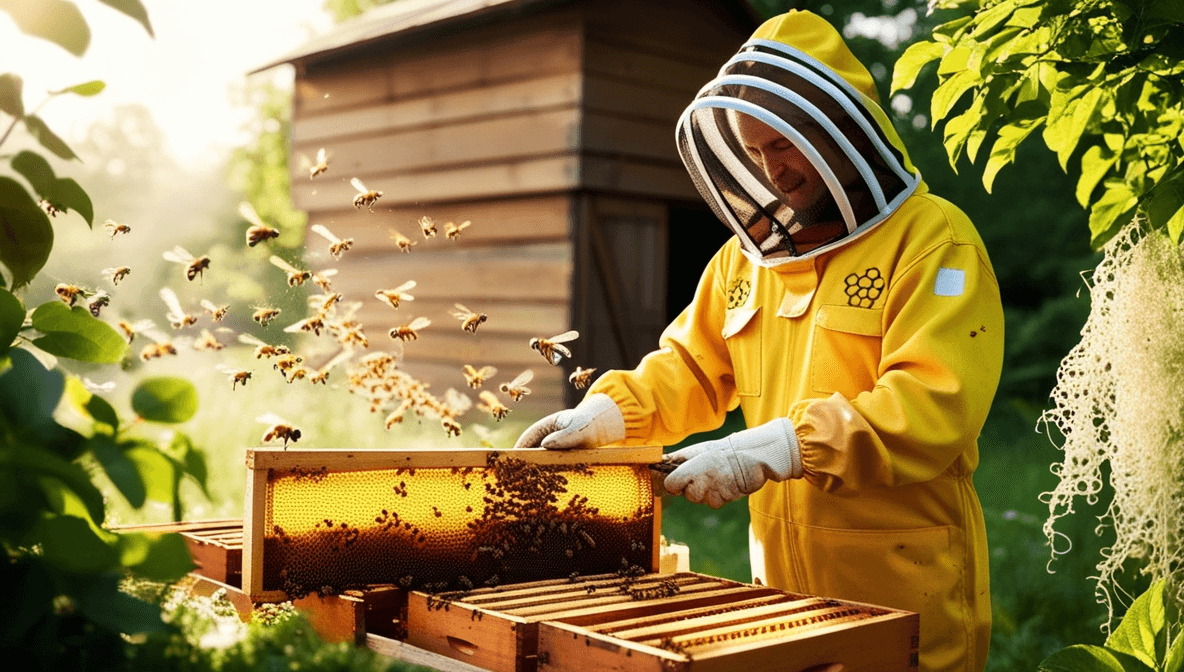Beekeeping: Nurturing Nature's Pollinators
Jun 26, 2024
Beekeeping, also known as apiculture, is the practice of maintaining honeybee colonies for the purpose of collecting their honey and other products, pollinating crops, and preserving these vital insects. As crucial pollinators, bees play an essential role in our ecosystem and agriculture. This article explores the fascinating world of beekeeping, its importance, and how to get started in this rewarding hobby.
The Importance of Bees
Bees are more than just honey producers; they are vital to our planet's biodiversity and food security. Here's why:
1. Pollination: Bees pollinate approximately 75% of global crops, including fruits, vegetables, and nuts. Without bees, our food supply would be severely impacted.
2. Ecosystem Balance: Bees help maintain the balance of various ecosystems by pollinating wild plants.
3. Economic Impact: The global economic value of pollination by bees is estimated to be over $200 billion annually.
4. Biodiversity: Bees contribute to the genetic diversity of plants through cross-pollination.
Given their importance, the decline in bee populations worldwide due to factors such as habitat loss, pesticides, and climate change is a serious concern. Beekeeping can play a crucial role in supporting and preserving these essential insects.
Getting Started with Beekeeping
If you're interested in beekeeping, here are the steps to get started:
1. Education and Training
Before acquiring bees, it's essential to learn about beekeeping practices, bee biology, and hive management. Consider:
• Taking a beekeeping course
• Joining a local beekeeping association
• Reading beekeeping books and online resources
• Shadowing an experienced beekeeper
2. Check Local Regulations
Beekeeping regulations vary by location. Check with your local authorities about:
• Zoning laws
• Permit requirements
• Hive placement restrictions
3. Gather Equipment
Essential beekeeping equipment includes:
• Hives (Langstroth hives are most common)
• Protective gear (suit, gloves, veil)
• Smoker
• Hive tool
• Frames and foundation
4. Choose a Location for Your Hives
Select a suitable location for your hives, considering:
• Sunlight exposure (morning sun is ideal)
• Wind protection
• Access to water sources
• Distance from neighbors
5. Obtain Bees
You can acquire bees through:
• Purchasing a package of bees
• Buying a nucleus colony (nuc)
• Capturing a swarm (with proper knowledge and equipment
6. Install Your Bees
Once you have your equipment and bees, it's time to install them in their new home. This process typically involves:
• Preparing the hive
• Transferring the bees into the hive
• Providing food (sugar syrup) if necessary
Hive Management
Successful beekeeping requires regular hive management. Here are some key aspects:
1. Regular Inspections
Inspect your hives every 1-2 weeks during the active season to:
• Check for signs of disease or pests
• Ensure the queen is present and laying eggs
• Monitor food stores
• Assess overall hive health
2. Pest and Disease Management
Common bee pests and diseases include:
• Varroa mites
• American and European foulbrood
• Nosema
• Small hive beetles
Implement integrated pest management strategies to keep your colonies healthy.
3. Feeding
Depending on the season and available forage, you may need to feed your bees:
• Sugar syrup (1:1 ratio of sugar to water in spring, 2:1 in fall)
• Pollen substitutes during periods of low pollen availability
5. Swarm Prevention
Swarming is a natural process where a colony divides. To prevent losing bees:
• Provide adequate space in the hive
• Replace old queens
• Use swarm control techniques like splitting hives
6. Seasonal Management
Beekeeping tasks vary with the seasons:
• Spring: Hive expansion and swarm prevention
• Summer: Honey production and pest management
• Fall: Preparing for winter, treating for mites
• Winter: Monitoring food stores and hive ventilation
Harvesting Honey and Other Hive Products
One of the most rewarding aspects of beekeeping is harvesting honey and other hive products:
1. Honey
Harvest honey when frames are at least 80% capped. Use an uncapping knife and extractor to remove honey from the frames.
2. Beeswax
Beeswax can be collected from cappings and old comb. It can be used for candles, cosmetics, and wood polish.
3. Propolis
This resinous substance collected by bees has antimicrobial properties and is used in natural medicines and cosmetics.
4. Pollen
Bee-collected pollen is rich in proteins and vitamins. It can be harvested using pollen traps.
The Environmental Impact of Beekeeping
Beekeeping can have both positive and negative impacts on the environment:
Positive Impacts:
• Increased pollination of local plants
• Support for declining bee populations
• Education and awareness about bee conservation
Potential Negative Impacts:
• Competition with native pollinators if not managed properly
• Spread of diseases to wild bee populations
• Potential for aggressive bee behavior if not properly managed
Responsible beekeeping practices can minimize these negative impacts while maximizing the benefits to both the beekeeper and the environment.
Challenges in Beekeeping
Beekeeping comes with its share of challenges:
1. Colony Collapse Disorder (CCD): This phenomenon, where worker bees abandon the hive, has been a significant concern for beekeepers worldwide.
2. Pesticides: Neonicotinoids and other pesticides can harm bee populations.
3. Climate Change: Changing weather patterns affect bee foraging and colony health.
4. Varroa Mites: These parasites are a major threat to honey bee colonies.
5. Urbanization: Loss of natural habitats affects bee populations.
Beekeepers must stay informed about these challenges and adapt their practices accordingly.
The Future of Beekeeping
As awareness of the importance of bees grows, so does interest in beekeeping. Future trends in beekeeping may include:
• Increased urban beekeeping
• Development of more bee-friendly pesticides
• Advanced monitoring technologies for hive health
• Greater focus on breeding disease-resistant bees
• Expansion of pollination services for agriculture
Conclusion
Beekeeping is more than just a hobby; it's a way to actively participate in environmental conservation and sustainable agriculture. By nurturing nature's pollinators, beekeepers play a crucial role in maintaining biodiversity and food security. Whether you're interested in harvesting honey, supporting local ecosystems, or simply learning more about these fascinating insects, beekeeping offers a unique and rewarding experience. As you embark on your beekeeping journey, remember that it requires patience, dedication, and continuous learning. Each hive is unique, and every season brings new challenges and rewards. By providing a safe haven for bees and managing your hives responsibly, you're not just keeping bees – you're becoming a steward of the environment and a guardian of these essential pollinators.
Whether you're tending to a single backyard hive or managing multiple colonies, your efforts contribute to the larger goal of supporting bee populations and, by extension, the health of our planet. As you grow in your beekeeping skills, you'll find yourself part of a community of passionate individuals all working towards the common goal of nurturing nature's pollinators for generations to come.





